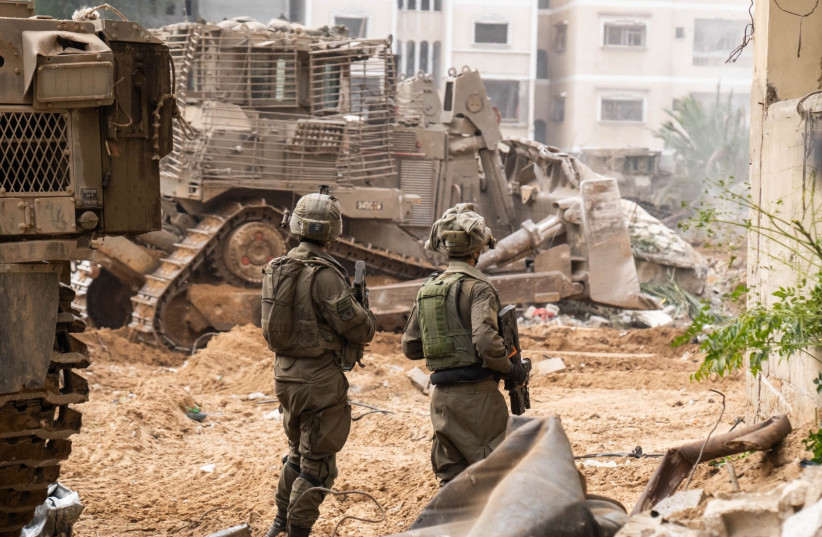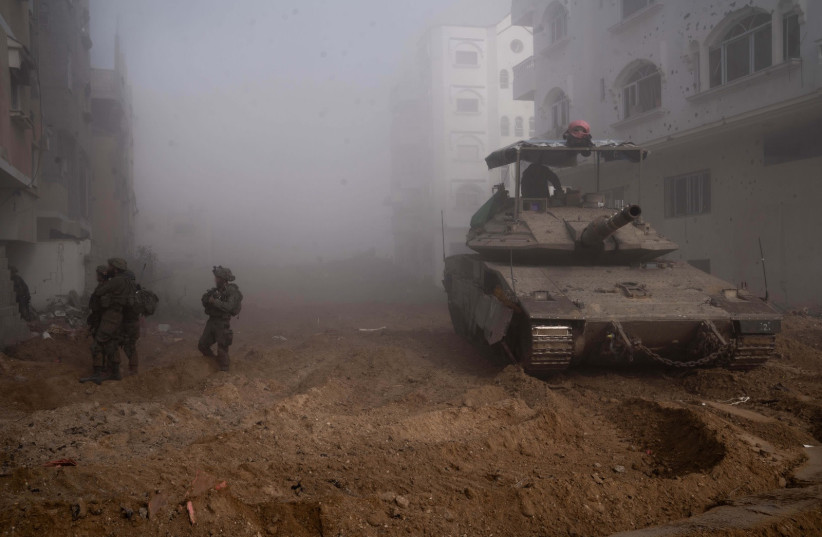Former IDF international law division head Col. (res.) Daniel Reisner told The Jerusalem Post in an interview on Tuesday that it is yet unclear how the International Court of Justice (ICJ) will rule on genocide charges against Israel – due to politicization levied against the Jewish state.
The panel’s 15 judges all receive joint approval from the UN Security Council and the UN General Assembly, but there is also a quota system where each region – Western countries, eastern Europe, North Africa and the Middle East, Asia, Latin America, and others – get a set number of judges, who each serve one set nine-year term.
“Some are among the best international legal scholars in the world; some are not the best. There is inconsistency in the level of legal expertise of the ICJ judges, but, generally speaking, it is the most respected international forum in the world,” said Reisner, who is, a partner at Herzog, Fox & Neeman law firm.
He said that “the judges are political appointees in the truest sense of the word. As a result, when it comes to ICJ rulings historically, if there is a dispute in which the countries [from which the judges come] don’t have a strong agenda, the court comes up with ultra-professional, ultra-exacting, high-level, sophisticated rulings. However, if the judges’ [home] countries have strong feelings, the judges suddenly come up with made-up legal rules.”

One example Reisner gave was the ICJ’s 2004 advisory ruling in which it declared the security wall Israel built in the West Bank illegal. There, he said, “the majority of the court said that Israel doesn’t have the right to self-defense because there is no right of self-defense” for a party that is occupying another’s territory, he recalled. “The general position of respectable international lawyers was that this was, at best, a laughable legal statement, if not worse, but an ICJ ruling is not something you can laugh away.”
Reisner outlined three components in the content the court is being asked to rule on this week, “concerning the provisional measures requirements which South Africa requested, the most important of which is the cessation of Israel’s military activities,” he stated. “There is no assumption that there is a genocide,” he pointed out, but rather only that South Africa must try to convince the court that if it does not order a cessation of military activities, additional irreversible harm will be caused – which connect to the genocide allegations.
After Thursday and Friday’s hearings, “it will take a few weeks to issue the decision. Then we come to the second stage, which should take a few months, probably including Israeli preliminary arguments, usually about jurisdiction, where Israel will claim the court has none.”
The third part of the proceedings – in which the court delves into the merits of both parties – would probably take 18 months to three years, Reisner estimated, based on past cases.
When it comes to whether Israel should be ordered to cease its military actions “there are many different considerations which judges could have in mind – mounting atop strict legal questions – such as whether it makes any sense to order a country fighting in self-defense to stop fighting.”
Unlike some cases where Israel relied on an interpretation of a law to allow preemptive self-defense to prevent an “imminent armed attack” by an enemy force, in this case, Hamas’s October 7 invasion constituted an actual “armed attack.” All parties agree that that case would allow a counter-response in self-defense – the only debate now is how far that counter-response can go.
Decision set to take weeks
In addition “to the complicated substantive discussion… there is also the political component. Last week, Russian Foreign Minister Sergei Lavrov said that Israel’s fight against Hamas is the same as Russia’s fight against Ukraine. I have never heard any Russians make this analogy at this level. There is an ongoing case in the ICJ filed by Ukraine, saying that Russia violated the Genocide Convention. That is exactly how politics could play a role in this proceeding,” noting that other countries might also have perceived interests in how the ruling plays out for them, beyond the specific legal and factual arguments involved.
Reisner shied away from predicting how the judges would rule on Israel, because of the mix of politics with legal considerations.
While Israel will appear at the ICJ, it denies the jurisdiction of the International Criminal Court (ICC), which opened a probe against it in early 2021. While the ICJ effectively has no enforcement mechanism, the ICC can demand any of its member states to arrest Israelis if charges with a crime should it come to that. Reisner explained he wasn’t sure what ICC Chief Prosecutor Karim Khan would do, and gave two explanations as to why.
The first, the ICC “it can focus on the specific incidents with a high civilian casualty rate, and analyze them to a granular level of detail,” while the second approach takes a bird’s-eye view at the general level of destruction. Knowing of the general state of destruction in Gaza, he said that the court could try to argue that “the evidence needed to justify the level of destruction is very high,” in terms of the IDF proving all acts were militarily necessary.
“From an international law perspective, the first approach is supposed to be taken in criminal cases because the rules of proportionality and distinction apply” in each attack, meaning he said, “There is no strategic rule, they are tactical rules.”
Despite that perspective, he acknowledged “it is very difficult to apply such a rule to individual cases when there are tens of thousands of individual attacks; the prosecution has a challenge to decide what approach they take. In that respect, the real question is will the prosecution focus on specific cases or” tries to take a global view, " he explained.
They will probably take a combination approach, Reisner reasoned, “which is what the ICTY [International Criminal Court for the Former Yugoslavia] did in several cases: They look at the big picture to set the threshold, but div into specific cases to apply it.”

Confronted with incidents where the IDF killed many Palestinian civilians by mistake, Reisner said the bottom line was that the IDF “only targets buildings because there is some military advantage. The crime should only be applied if there is no military advantage or if it is significantly underwhelming as opposed to the potential damage to the civilian population. Civilian deaths follow the same rule, but I assume the court will require a higher level of military advantage,” he stated.
The rule, as he interprets it and as the US interprets it, though other international law experts interpret it differently, is that the legal test examines what the anticipated military advantage was when the attack was carried out.
He explained further that “the legality of the attack is calculated based on the information available to the commander at the time of the attack. There is no retroactive assessment.” For example, if, at the time of the attack, estimates were that five senior enemy combatants would be killed, along with four innocent civilians, that would be a lawful attack, even if the attack led to one hundred or two hundred dead civilians. “The crime,” he explained, “is launching the attack when you know you are causing disproportionate harm; it is not about, after the fact, what someone thinks you should have known. If you can show a pattern of negligence or willful disregard, then you have a bigger problem. I don’t think they will be able to show such a pattern because I don’t think it exists… The opposite is true – all of the commanders instructed all of their forces to fully comply with the rules, including proportionality and distinction.”
He continued: “In wars, people make mistakes, no one has fully accurate information on the battlefield. To dive into specific incidents and say [for example that for] attack 3,472 we don’t think it complied will the rule of proportionality. No one can do that. No one can comply 100% of the time.”
Questioned about the government’s decision to prevent the transfer of water in the early days of the war, he said he didn’t know what the legal considerations were, and that “It is a very strange situation. That the territory which attacked us is partially dependent on us for essentials is unprecedented. It’s also unprecedented” for Gaza to be reliant on Israel for essentials as the war has dragged on.
“Usually, international law would dictate that you have to enable humanitarian supplies to come in – no one expects them to come from you” – rather from a third party.
Anyone analyzing current humanitarian issues “needs to realize Israel’s level of responsibility is now different in different parts of Gaza. Gaza was not occupied at all by Israel on October 7, but now significant parts of it are fully occupied, something that brings with it the responsibility of ensuring the safety and basic requirements” of the thousands of Palestinians who are still there.
This is a “new situation. This is no longer a question of enabling humanitarian aid to enter Hamas-controlled territory. This is to ensure Israel supplies [the aid] within Israeli-controlled territory.
“There are also areas where our control is being contested. That is a combat zone, like Khan Yunis. It is unclear who is responsible for what is there. There is a third zone: where Hamas is nominally in control. There, the focus is still on the general rule to enable humanitarian support to the civil population even in enemy-controlled areas under certain circumstances. The Gaza Strip is no longer a uniform area,” he concluded.
“In every war, you have a military campaign, an international political campaign for public opinion, and on the media and legal front. Usually, the legal front lags behind the others… but lasts for much longer. This is the first war I remember where the fighting and legal campaign coincided because the war is going to be much longer,” than in the past.
He noted that besides the South Africa case, the UN General Assembly also previously asked the ICJ to decide whether Israel is illegally occupying the West Bank and Gaza, including requiring an immediate withdrawal.
Further, he said that Norway and other countries are also pursuing war crimes allegations against Israel in their national courts – “with nothing against Hamas of course.”
“We’re seeing the legal arena erupting on multiple fronts and I think it’s only going to get worse.”
